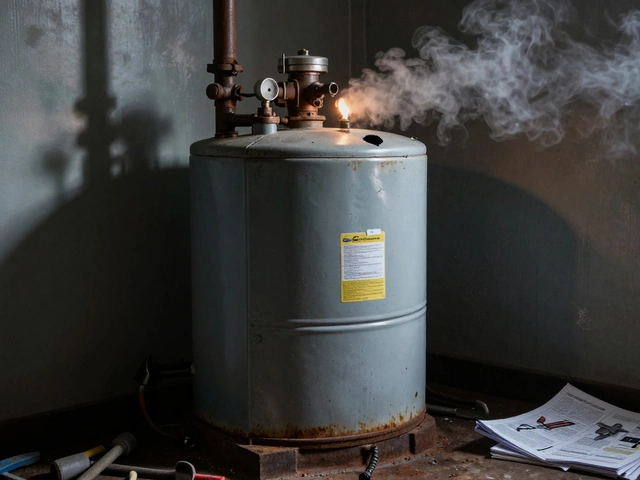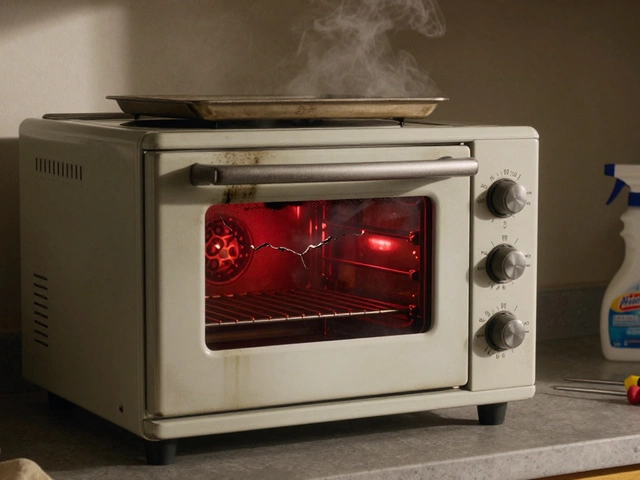Paying for boiler service is one of those things that can get tricky, especially when you’re not sure who’s supposed to handle it. If you're living in a rented place, figuring out if it's on the landlord or you is key to avoiding unnecessary stress (and costs). And if you're a homeowner, it's all about knowing the smartest way to keep your boiler chugging along without breaking the bank.
Let's break this down: If you rent, typically it's the landlord's job to keep the boiler serviced and safe. This means they should cover the cost of regular check-ups and any necessary repairs to make sure the place stays warm. Of course, if you’re living in a lease that says otherwise, you might need to chat with your landlord to clarify things.
For homeowners, it’s pretty much straightforward—if you own it, you fix it. But fear not, it’s not all bad news. Regular maintenance can prevent those dreaded big repair costs down the line. Plus, a well-serviced boiler runs more efficiently, saving you some cash on energy bills. It's like giving your heating system a health check-up that pays off in the long run.
- Understanding Boiler Service Basics
- When Landlords Are Responsible
- Tenants' Responsibilities
- Homeowners and Boiler Maintenance
- Tips for Cost-Effective Boiler Care
Understanding Boiler Service Basics
Alright, so let’s get to grips with what boiler service is all about. At its core, it’s kind of like taking your car in for a regular check-up. A certified engineer pops over to give your boiler a once-over, making sure everything’s running smoothly and safely. This typically includes cleaning parts, checking for any issues, and adjusting controls if necessary.
Why bother? Well, much like showing up at the dentist, these check-ups can prevent minor issues from snowballing into full-blown disasters. If you're thinking about cutting corners and skipping service, keep in mind that a neglected boiler can be a safety hazard and lead to costly repairs or even replacement.
Usually, a boiler service should happen once a year, and it’s often best timed just before the chilly months hit, so you know you’re ready to crank up the heat without any hiccups. For some boilers, regular servicing is required to keep the warranty valid—definitely worth checking out those fine print details.
Okay, so you might be wondering: what’s the damage? A typical boiler service can set you back anywhere from $80 to $180, depending on your location and the boiler type. Sure, it’s not loose change, but think of it as a worthwhile investment. A well-maintained boiler runs more efficiently, saving you bucks on energy bills in the long haul.
Here's a little breakdown of what happens during a standard service:
- Inspection of the boiler and controls to ensure they’re working correctly.
- Checking for corrosion and leaks.
- Testing the gas pressure and flow.
- Inspecting the flue and emissions to ensure it’s not producing harmful by-products.
- Cleaning parts as needed and replacing any worn-out ones.
Sounds simple, right? It mostly is, but it's vital to let a pro handle it since they’ve got the knowledge and tools to ensure everything’s spot on. Keeping track of these services gives you peace of mind, ensures compliance with health and safety standards, and shields your wallet from surprise breakdowns.
When Landlords Are Responsible
So, who’s picking up the tab for that boiler service when you’re renting? It’s usually on the landlord. The general rule is if it’s part of the property's core infrastructure, like central heating and water systems, then it's the landlord's job to keep it working and safe. So, you can breathe easy knowing you’re not expected to fork over money for regular boiler maintenance or repairs out of your pocket.
A lot of places have laws that make this responsibility clear. In the UK, for example, the Landlord and Tenant Act 1985 lays it down that landlords have to fix and keep in working order the installation of heating and hot water. The key word here? Installation. If it's part of the building’s basic systems, it's typically on them to sort out.
But here’s where you gotta pay attention: the duty of care doesn’t cover everything a tenant might mess up. If someone manages to break the boiler through sheer negligence—accidentally putting the wrong kind of pressure on it, for instance—then you might find the costs slamming right back on you. It's like when a friend messes up your car and expects you to pay for repairs. Not cool.
Regular checks are important, and landlords often get annual service contracts with maintenance companies to make sure everything’s in tip-top shape. This not only keeps boilers from breaking down but also helps snag any inefficiencies that could be inflating the energy bills. After all, a boiler running smoothly is a boiler saving money and keeping everyone warm.
Here’s a quick table to break down who pays for what:
| Responsibility | Who Pays |
|---|---|
| Regular Boiler Service | Landlord |
| Repairs due to Wear and Tear | Landlord |
| Damage due to Tenant Negligence | Tenant |
So there you have it. Keep open communication with your landlord about boiler checks to dodge any unexpected issues. And hey, always know what's spelled out in your lease to avoid any awkward surprises.

Tenants' Responsibilities
If you're renting, you might think all boiler issues are your landlord's duty, but that’s not always true. While landlords usually cover boiler maintenance and repairs, tenants also have some responsibilities to keep things running smoothly.
One essential duty is to report any problems with the boiler promptly. If you notice strange noises, leaks, or issues with heating, contacting your landlord or letting agent right away is crucial. Delaying might worsen the problem, and some contracts even state that tenants could be liable for further damage caused by unreported issues.
Another important task for tenants is general upkeep of the heating system. This includes:
- Keeping the area around the boiler clear of clutter for safety and ease of access.
- Regularly bleeding radiators to prevent cold spots and ensure efficient heating.
- Monitoring the boiler pressure and following any simple instructions provided by the landlord if it needs adjusting.
Tenants must also allow access for annual checks or repairs. Scheduling conflicts happen, but it’s essential to facilitate these visits to maintain the boiler service agreement and ensure safety.
Here’s a little nugget not many people know: In a survey conducted in 2023, it was found that 40% of tenants didn’t realize they had any responsibility in boiler care, leading to misunderstandings with landlords. Being aware and proactive can save you from disputes and ensure a comfy, snug home.
Homeowners and Boiler Maintenance
Owning a home comes with its fair share of responsibilities, and keeping your boiler in good condition is one of them. Regular boiler maintenance is like keeping your car's engine in top shape—it saves you from bigger headaches down the road. The good thing is, making sure your boiler stays in tip-top shape isn’t as daunting as it sounds.
First things first, it's crucial to have your boiler serviced annually. This routine check-up not only helps in catching potential problems early but also ensures that your system runs efficiently, keeping those energy bills in check. Plus, a regularly serviced boiler is less likely to suffer critical failures in the dead of winter when you need it the most.
- Annual Check-Up: Schedule a yearly service with a certified technician. They'll look at everything from the burner and heat exchanger to the controls and seals, making sure everything’s operating smoothly.
- DIY Checks: While it’s best to leave the technical stuff to the pros, there are simple things you can do yourself. Regularly check the pressure gauge and keep an eye on any unusual noises.
- Thermostat Settings: Make sure your thermostat is set for energy efficiency. A small tweak here and there can save you a good amount on heating expenses.
A handy stat to keep in mind: regular maintenance can improve a boiler’s efficiency by up to 15%. That adds up over time, both in energy savings and lifespan of your system. So, while it may cost a few bucks upfront, the long-term savings make it well worth the effort.
And remember, ignoring boiler issues doesn’t just risk a chilly house—it can also be dangerous. If you notice leakages, odd smells, or the dreaded pilot light going out repeatedly, call a professional without delay. These could be signs of carbon monoxide leaks or other safety hazards.
At the end of the day, consistent and thorough maintenance is your best ally in making sure that your boiler remains a reliable part of your home’s heating setup. And hey, a little prep work now means a cozy, trouble-free winter later!

Tips for Cost-Effective Boiler Care
Keeping your boiler in tip-top shape doesn’t have to drain your wallet. A few smart choices can make your boiler maintenance way more budget-friendly. Let’s dive into some simple, practical tips you can use to keep those costs in check.
First up, regular servicing is your best friend. Catching small issues early can prevent major repairs later. But how often should you service it? The general guideline is once a year. Schedule it before winter hits so you're not left freezing during a cold snap.
"Regular boiler servicing not only ensures efficiency but also prolongs the lifespan of the appliance." — British Gas
Next, keep an eye on your thermostat settings. You might be cranking up the heat more than necessary. Lowering your thermostat by just one degree can save around 10% on heating bills over the year. Give it a try and see the difference in your next bill.
- Bleed your radiators. Trapped air can make your boiler work harder than it needs to. Get rid of that air, and your boiler will thank you with better efficiency.
- Check the pressure regularly. If it’s too low or too high, your boiler won’t run efficiently. The manual should have instructions on how to manage this.
- Invest in a magnetic filter. It helps keep the water cleaner by trapping sludge and debris, which means less wear and tear.
And don’t forget about boiler service cost plans. Some companies offer fixed-price packages which include annual maintenance checks. It might seem like an extra expense, but it could save you from unexpected repair bills in the future.
Lastly, consider energy-efficient controls and upgrades. If your boiler's more than 10 years old, it might be time for a replacement. Newer models are way more efficient and can save you in the long run on fuel costs.
| Maintenance Tip | Potential Savings |
|---|---|
| Thermostat adjustment | 10% savings on heating bills |
| Annual service | Prevent costly repairs |
Getting proactive with your boiler not only helps with repair expenses but also ensures you're not left in the cold at the worst possible moment. It’s all about being smart now to save big later.





